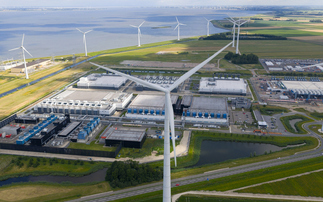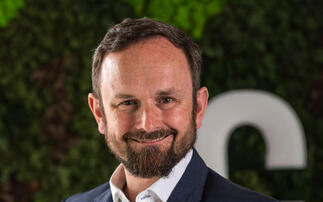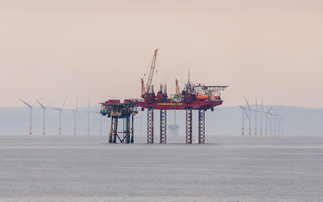People make two common mistakes when it comes to predicting the future, according to Tim Harford, and here's how to avoid them when thinking about the future of energy
If Hollywood is to be believed, in 2001 there was meant to be a hotel in the International Space Station; 2015 was meant to bring floating hoverboards; and by 2019, we were going to have replicants walking among us.
The film industry's narrative excesses perfectly capture the first problem with trying to predict the future, author and Financial Times columnist Tim Harford told delegates at Shell's Powering Progress Together summit last week. People are always fixated on the most complex, most sophisticated pieces of technology when designing a vision of the future, and as such they lose sight of the everyday stuff.
Take Bladerunner. Rachel, the replicant star of the 1982 movie, is a "remarkable piece of technology", Harford acknowledges. "She is the result of biotechnological processes so complex that it is impossible for a non-specialist to tell a replicant apart a human," he said. "In fact, even a specialist with skill and training needs highly sophisticated equipment to be able to spot a replicant. And she has a brain that is very similar to a human brain. She has artificial intelligence. She even has artificial memories."
But contrast the sophistication of Rachel with the other technology in the film, and you'll start to see where Hollywood went wrong. When Rick Deckard, played by Harrison Ford, wants to speak to Rachel, he calls her on a video payphone covered with graffiti in the back corner of a local bar.
"On the one hand we have this unbelievably sophisticated artificial intelligence, artificial life, and on the hand you've got a payphone on a wall that you are feeding coins into," Harford observed.
"In BladeRunner, we've lost sight of [the fact] that maybe phones will get smaller," he argued. "And actually, when phones get small enough, they'll start fitting in our pockets. And actually, maybe they won't just be phones anymore, maybe they will be television screens, maybe they will be computers, and they'll be digital products and tracking devices and all these other things. We lose sight of that, because we're fixated on this one incredibly sophisticated technology."
When something gets cheap enough to wipe your backside on, it is cheap enough to change the world - Tim Harford
Harford, also known as the Undercover Economist, is famous for his books and columns that look at familiar situations in new ways, spotting the patterns that others miss. According to his theory of predicting the future, one of the first lessons to remember when gazing at the horizon is not to forget the cheap stuff. "When something gets cheap enough to wipe your backside on, it is cheap enough to change the world," he said.
The second lesson Harford offers is that too often experts make the mistake of superimposing the social structures of today onto scenarios for tomorrow.
Pointing to a 1968 episode of Tomorrow's World, which purported to show the 'Office of the Future', he observed that the "only thing" the programme got right was people's innate need to press buttons for messages, but everything else was wrong. "What they basically did was show you an office from 1968 and put some different toys in it," he said. "So you have exactly the same social structure - there's a guy a three piece suit, who's taller than everyone else, middle aged, surrounded by pretty young women who are presumably unmarried and the secretaries… He hasn't got a computer on his desk, because why would a man of power have something a bit like a typewriter on his desk? Of course not. But the desk is made of Perspex, because it's the future."
What people fail to spot when considering the future is what impact new technologies will have on the very fabric of society itself, he argued. Technology empowers a totally new system of social organisation, from executives able to work from wherever they are in the world on laptops lighter than a pad of paper, to electric power enabling a total reorganisation of a factory. It is not enough to think solely about a technology's utility, Harford stressed. Instead, it's necessary to think about the kinds of secondary change that technology might prompt.
So what does all this mean for predicting the future of energy? The secret, for Harford, lies in combining cheap technology with social change. In his eyes therefore, the UK's energy future will bring mass use of solar power, other renewables and batteries to create a smart, dynamic grid that is highly intermittent.
This intermittency will, in part at least, be solved thanks to the transformational influence of cheap sensors. "Everything we use is going to have a little sensor in, every tiny increment of electricity is going to vary in price, depending on whether the sun is out or whether the sun is not out," he predicted.
And crucially, people won't even notice what is happening. "The sun goes behind the cloud, your freezer switches off, just for a few seconds," he explained. "Your laptop stops charging, unless you put it on 'absolute charge at all costs' mode. Your car, which is plugged into your house, which was drawing electricity from your house, is suddenly pumping electricity back in. All of these different devices communicate with each other, they'll talk to your calendar, they'll know how likely you are to take a trip, whether your phone is low on charge or not, they will constantly be responding."
It might not be a future replete with hoverboards and replicants, but that does not mean it will be any less transformational, he said. "It's not actually going to be very different to today," he continued. "We're still going to have laptops. We're still going to have phones. It's going to work exactly like it does today, except it's going to be enormously more efficient. And that is how technological change often works. We restructure things below the surface, and we do so with the most simple technology that is getting cheaper and cheaper. Cheap changes the world."
It's perhaps unfair to accuse Hollywood of always getting predictions of the future badly wrong. After all, the makers of Back to the Future II didn't set out to paint an accurate depiction on life in 2015. "We knew we weren't going to have flying cars by the year 2015, but God we had to have those in our movie," Bob Gale, one of the screenwriters on the film, has said.
But when energy industry executives and governments are making major investment decisions that will shape the structure of the UK energy system for decades to come, the stakes are higher than on a Hollywood movie set. Those visions of the future can have a long-tail legacy.
Tomorrow the National Grid will release its Future Energy Scenarios, its annual foray into future gazing, setting out its four competing visions of a future energy system. Will it make the same mistakes as Hollywood or will it adhere to Harford's two rules and attempt to incorporate the disruptive power of low cost technology and the complex feedback loops that will inevitably flow around tomorrow's economy?
The BusinessGreen Powering Progress Together Hub is supported by Shell. All the hub's content is editorially independent, unless stated otherwise.









